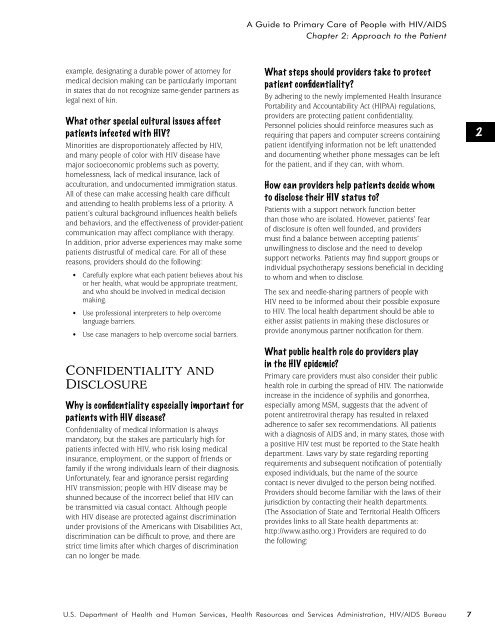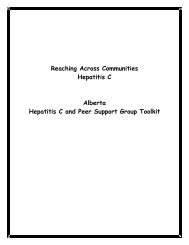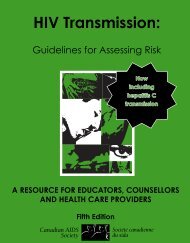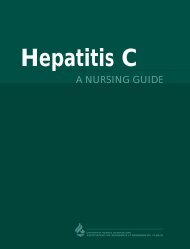A Guide to Primary Care of People with HIV/AIDS - Canadian Public ...
A Guide to Primary Care of People with HIV/AIDS - Canadian Public ...
A Guide to Primary Care of People with HIV/AIDS - Canadian Public ...
You also want an ePaper? Increase the reach of your titles
YUMPU automatically turns print PDFs into web optimized ePapers that Google loves.
A <strong>Guide</strong> <strong>to</strong> <strong>Primary</strong> <strong>Care</strong> <strong>of</strong> <strong>People</strong> <strong>with</strong> <strong>HIV</strong>/<strong>AIDS</strong><br />
Chapter 2: Approach <strong>to</strong> the Patient<br />
example, designating a durable power <strong>of</strong> at<strong>to</strong>rney for<br />
medical decision making can be particularly important<br />
in states that do not recognize same-gender partners as<br />
legal next <strong>of</strong> kin.<br />
What other special cultural issues affect<br />
patients infected <strong>with</strong> <strong>HIV</strong>?<br />
Minorities are disproportionately affected by <strong>HIV</strong>,<br />
and many people <strong>of</strong> color <strong>with</strong> <strong>HIV</strong> disease have<br />
major socioeconomic problems such as poverty,<br />
homelessness, lack <strong>of</strong> medical insurance, lack <strong>of</strong><br />
acculturation, and undocumented immigration status.<br />
All <strong>of</strong> these can make accessing health care difficult<br />
and attending <strong>to</strong> health problems less <strong>of</strong> a priority. A<br />
patient’s cultural background influences health beliefs<br />
and behaviors, and the effectiveness <strong>of</strong> provider-patient<br />
communication may affect compliance <strong>with</strong> therapy.<br />
In addition, prior adverse experiences may make some<br />
patients distrustful <strong>of</strong> medical care. For all <strong>of</strong> these<br />
reasons, providers should do the following:<br />
• <strong>Care</strong>fully explore what each patient believes about his<br />
or her health, what would be appropriate treatment,<br />
and who should be involved in medical decision<br />
making.<br />
• Use pr<strong>of</strong>essional interpreters <strong>to</strong> help overcome<br />
language barriers.<br />
• Use case managers <strong>to</strong> help overcome social barriers.<br />
CONFIDENTIALITY AND<br />
DISCLOSURE<br />
Why is confidentiality especially important for<br />
patients <strong>with</strong> <strong>HIV</strong> disease?<br />
Confidentiality <strong>of</strong> medical information is always<br />
manda<strong>to</strong>ry, but the stakes are particularly high for<br />
patients infected <strong>with</strong> <strong>HIV</strong>, who risk losing medical<br />
insurance, employment, or the support <strong>of</strong> friends or<br />
family if the wrong individuals learn <strong>of</strong> their diagnosis.<br />
Unfortunately, fear and ignorance persist regarding<br />
<strong>HIV</strong> transmission; people <strong>with</strong> <strong>HIV</strong> disease may be<br />
shunned because <strong>of</strong> the incorrect belief that <strong>HIV</strong> can<br />
be transmitted via casual contact. Although people<br />
<strong>with</strong> <strong>HIV</strong> disease are protected against discrimination<br />
under provisions <strong>of</strong> the Americans <strong>with</strong> Disabilities Act,<br />
discrimination can be difficult <strong>to</strong> prove, and there are<br />
strict time limits after which charges <strong>of</strong> discrimination<br />
can no longer be made.<br />
What steps should providers take <strong>to</strong> protect<br />
patient confidentiality?<br />
By adhering <strong>to</strong> the newly implemented Health Insurance<br />
Portability and Accountability Act (HIPAA) regulations,<br />
providers are protecting patient confidentiality.<br />
Personnel policies should reinforce measures such as<br />
requiring that papers and computer screens containing<br />
patient identifying information not be left unattended<br />
and documenting whether phone messages can be left<br />
for the patient, and if they can, <strong>with</strong> whom.<br />
How can providers help patients decide whom<br />
<strong>to</strong> disclose their <strong>HIV</strong> status <strong>to</strong>?<br />
Patients <strong>with</strong> a support network function better<br />
than those who are isolated. However, patients’ fear<br />
<strong>of</strong> disclosure is <strong>of</strong>ten well founded, and providers<br />
must find a balance between accepting patients’<br />
unwillingness <strong>to</strong> disclose and the need <strong>to</strong> develop<br />
support networks. Patients may find support groups or<br />
individual psychotherapy sessions beneficial in deciding<br />
<strong>to</strong> whom and when <strong>to</strong> disclose.<br />
The sex and needle-sharing partners <strong>of</strong> people <strong>with</strong><br />
<strong>HIV</strong> need <strong>to</strong> be informed about their possible exposure<br />
<strong>to</strong> <strong>HIV</strong>. The local health department should be able <strong>to</strong><br />
either assist patients in making these disclosures or<br />
provide anonymous partner notification for them.<br />
What public health role do providers play<br />
in the <strong>HIV</strong> epidemic?<br />
<strong>Primary</strong> care providers must also consider their public<br />
health role in curbing the spread <strong>of</strong> <strong>HIV</strong>. The nationwide<br />
increase in the incidence <strong>of</strong> syphilis and gonorrhea,<br />
especially among MSM, suggests that the advent <strong>of</strong><br />
potent antiretroviral therapy has resulted in relaxed<br />
adherence <strong>to</strong> safer sex recommendations. All patients<br />
<strong>with</strong> a diagnosis <strong>of</strong> <strong>AIDS</strong> and, in many states, those <strong>with</strong><br />
a positive <strong>HIV</strong> test must be reported <strong>to</strong> the State health<br />
department. Laws vary by state regarding reporting<br />
requirements and subsequent notification <strong>of</strong> potentially<br />
exposed individuals, but the name <strong>of</strong> the source<br />
contact is never divulged <strong>to</strong> the person being notified.<br />
Providers should become familiar <strong>with</strong> the laws <strong>of</strong> their<br />
jurisdiction by contacting their health departments.<br />
(The Association <strong>of</strong> State and Terri<strong>to</strong>rial Health Officers<br />
provides links <strong>to</strong> all State health departments at:<br />
http://www.astho.org.) Providers are required <strong>to</strong> do<br />
the following:<br />
2<br />
U.S. Department <strong>of</strong> Health and Human Services, Health Resources and Services Administration, <strong>HIV</strong>/<strong>AIDS</strong> Bureau<br />
7

















